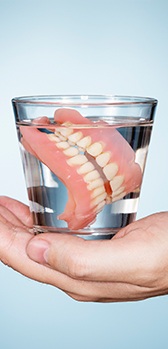2019 Newsletter Adjusting to Life with Dentures
Attention All Current and Future Denture Users!
Dentures have been around for quite some time now, but advancements in dental materials and technology have only made them more lifelike than ever before. As a result, more patients can benefit from their daily use and get back to smiling and expanding their diet. With that said, Dr. Balington and the team at Denton Dental Center understand that adjusting to a new denture can be difficult for some at first. Furthermore, those who have had a denture or currently use one may notice their device becoming worn down quicker than they expected.
That’s why, for this month’s newsletter, we wanted to break down the best ways to adjust to and take care of a new denture. With these tips in mind, you’re far more likely to speed up your adjustment time and prolong the life of your restoration.

Adjusting
to a New Denture
Aging comes with it’s fair share of adjustments. New medications, hearing aids, reading glasses; all of these solutions take some level of getting used to. However, dentures can be one of the most difficult, especially if it’s your first one. After your denture is made, it’s important that you take note of all of Dr. Balington’s recommendations during your unique adjustment process.
For example, it’s normal to experience the following:
- Higher saliva production
- Minor irritation and soreness
- Loose-fitting denture
- Difficulty pronouncing certain words
- Occasional slipping while speaking, laughing, smiling and coughing
To combat these issues, take the following steps into consideration:
- Take hour-long breaks after wearing your denture for an extended period of time. This will reduce irritation and sore spots.
- After the areas where tooth were removed have fully healed, start using denture adhesive. This only applies to patients whose gums have not fully healed over recent extraction sites.
- Stick to a diet of soft foods (applesauce, yogurt, mashed potatoes, steamed vegetables, soft-cooked beans, stews, soups etc.) during the first couple weeks, then slowly reintroduce other foods as you get comfortable.
- For easier pronunciation, speak out loud or sing throughout the day. If your denture clicks, speak slower.

Making Your Denture Last Longer
Many patients end up needing to replace their denture because of improper care or accidental damage (dropping them in the sink while cleaning or a pet using it as a chew toy.) To make your denture last for several years, practice the following steps:
- Remove your denture while sleeping. This reduces sore spots and prevents unnecessary pressure on your gums, which can result in them fitting improperly.
- Keep your denture in either cold or lukewarm water when not in use. This prevents them from drying out and changing shape.
- To prevent staining, foul smells and food debris buildup, clean your denture twice a day with either a denture toothpaste or cleaner and soft-bristled toothbrush. Avoid traditional toothpaste which is typically too abrasive for dentures.
- Place a towel in your sink or fill it with water while you clean your denture. If you accidentally drop it, the towel/water will act as a cushion.
- Keep your denture out of reach or inside a case if you have pets. Dogs can easily chew and permanently damage them while cats could knock them onto the ground and crack them.

When
It’s Time to Visit Denton Dental Center
Daily oral care makes a big difference when it comes to denture care, but you’ll still want to visit our practice regularly so we can confirm that it fits properly. This is particularly important after receiving either your first denture or a brand-new version.
Since your mouth isn’t used to this device, Dr. Balington wants to make sure that your denture continues to fit properly. If for any reason you experience issues for longer than a month or significant discomfort, you may need to have your denture relined or replaced. Relining dentures is a normal part of their use, but you shouldn’t need one so soon after receiving it unless something is wrong.
If you’re having issues with your denture or simply want to schedule an appointment to have your denture created, don’t hesitate to contact our office and schedule an appointment!

To Schedule an Appointment!
